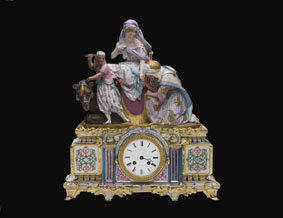Dreadful Delight
dal 25/4/2007 al 23/2/2008
Segnalato da
25/4/2007
Dreadful Delight
National Museum, Stockholm
19th century design. The exhibition features more than 300 items and presents an abundance of ceramics and porcelain together with magnificent items of silver and glass, furniture, jewellery and designs for jewellery in styles ranging from neo-baroque and neo-rococo to a historicizing proto-Norse style.

19th century design
curated by Helena Kaberg
Dreadful Delight is an exhibition devoted to the innovative and brightly coloured world of 19th century design; a surprisingly progressive and modern world. Opening at the Nationalmuseum in Stockholm on 26 April 2007.
We live in an era that regularly prefers simplicity – if not austerity – of design in sharp contrast to the mixed ideals that governed style in the 19th century. At the same time there is a growing interest in the designs of the late 19th century and the methods of manufacture used in both crafts and fashion. In April the Nationalmuseum in Stockholm will open its doors to the innovative and brightly coloured world of the 19th century in an exhibition featuring more than 300 items. Under the heading Dreadful Delight the exhibition will present an abundance of ceramics and porcelain together with magnificent items of silver and glass, furniture, jewellery and designs for jewellery in styles ranging from neo-baroque and neo-rococo to a historicizing proto-Norse style. Ceramics and porcelain form the central feature of the exhibition with most of the items taken from the Gustavsberg Collection which was donated to the Nationalmuseum by the Swedish Cooperative Union in 2000. Visitors will have a fine opportunity to enjoy the surprisingly progressive and modern styles of the 19th century.
Throughout the 20th century attitudes to the stylistic ideals of the 19th century tended to be judgmental and aggressive. But the designs of the period were, in fact, daring and often outspoken in their mixture of colours, forms, materials and patterns. For example, it was considered innovative and progressive to be able to design wares that looked as though they had been made by hand but had actually been manufactured industrially in a mould or press. Products were designed to look like metal though made from ceramic materials. Decorative motifs were borrowed from well-known picture banks such as popular works of art, old Norse subjects and patterns while romantic nationalist ideas were ever popular. The use of pictures and images on 19th century wares raises questions that are relevant today. What is Swedish? What does the passion of Old Norse culture stand for? Today's demands for functional design cause many people to feel confused by certain 19th century objects and this can provide a starting point for contemporary discussion of such issues as functionality, consumption, communication and durability.
The premises of the Nationalmuseum, which were opened to the public in 1866, are particularly well suited as a period background to this visual experience. But the design of the exhibition does not seek to mimic the surroundings. Rather, the intention is to stimulate an experience and arouse emotions like those that the consumers and viewers of the 19th century might have had when they first visited a grand exhibition of art and industry, a well-stocked department store or buildings aiming to represent what was modern and progressive.
For those who want to pursue these issues in greater depth, the exhibition and catalogue address matters such as how design influences and is influenced by industrialization, new patterns of production and consumption, the movement of population from the country to the towns, economic growth and social revolutions. The catalogue contains essays by Kajsa Rosenblad, Karin Linder, Anders Ekström, Christina Zetterlund, Helena Kåberg and Penny Sparke.
There are contemporary items in the exhibition by Anna Berglund, Jakob Robertsson, Per B. Sundberg, Hella Jungerius, Paul Scott and Cindy Sherman.
Opening 26 april
National Museum
Sodra Blasieholmshamnen - Stockholm



